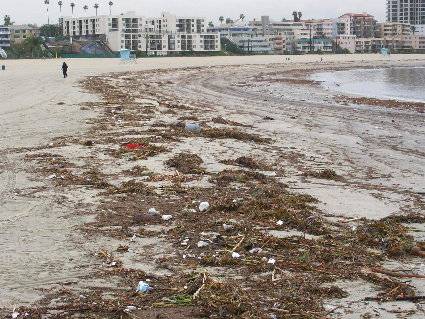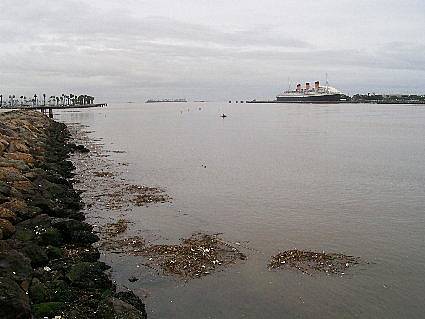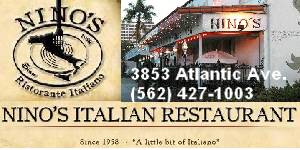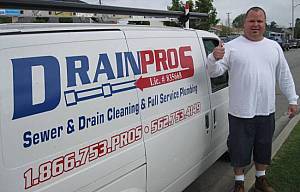(June 1, 2011, 8:27 a.m.) -- As first reported yesterday by LBReport.com, Long Beach Area Chamber of Commerce President/CEO Randy Gordon has signed a letter opposing SB 568 authored by State Senator Alan Lowenthal (D., Long Beach-Paramount) that would forbid food vendors from dispensing prepared food in polystyrene foam ("styrofoam") food containers. (The bill was amended on May 23 to include a proviso letting cities, counties or school districts permit such uses if there is a reasonable liklihood that annually at least 60% of the styrofoam containers will be recycled.)

Polystyrene items dot L.A. River litter in LB following Jan. 2008 storm. LBReport.com photo.
LBReport.com has obtained a copy of Mr. Gordon's LB Chamber letter, dated May 31, and provides its full text below. It is nearly identical to the text of a May 25 opposition letter from the CA Chamber of Commerce, a statewide group whose membership includes inland areas not impacted by ocean and beach refuse.

LBReport.com photo following Jan. 2008 storm.
The LB Chamber letterhead correspondence came on the same day (May 31) that LBReport.com reported that SB 568 was poised for a full state Senate floor vote this week [June 3 rule deadline].
On May 25, the CA Chamber labelled Sen. Lowenthal's bill a "job killer" (the CA Chamber's worst category of legislation) in a letter that includes two short closing paragraphs omitted in Mr. Gordon's LB Chamber letter.
[CA Chamber letter closing verbiage: "The Senate should not be rushed into passing a short-sighted recycling bill under the guise that it is a reasonable and workable approach. As drafted, SB 568 (Lowenthal) continues to put jobs at risk and falls short environmentally because it remains focused on just one type of take-out food packaging material. For these and other reasons, the California Chamber of Commerce OPPOSES SB 568 (Lowenthal) as a JOB KILLER, and respectfully requests a "NO" vote when it come before you for consideration."]
The LB Area Chamber letter is cc'd to the LB-area state legislative delegation; the CA Chamber while the CA Chamber's "job killer" letter is cc'd to Gareth Elliot in the Office of the Governor and to the Senate Republican Caucus.
Mr. Gordon's letter doesn't indicate the circumstances under which LB Area Chamber's leadership came to take an opposition position on Sen. Lowenthal's SB 568. The LB Chamber letter doesn't indicate if or when (and by what margins) the LB Area Chamber's governing Board, Executive Committee, or Government Advisory Council voted to take the position expressed by Pres/CEO Gordon on SB 568.
News of LB Chamber's letter came during the May 31 meeting of the City Council's State Legislation Committee, heard LIVE on LBReport.com [not available live on the City Clerk's website], when City of Long Beach Director of Government Affairs, Tom Modica, publicly informed the Committee's members (O'Donnell, Johnson, Garcia) of the LB Chamber letter during discussion of a management-agendized item seeking Committee guidance on whether to recommend full City Council support for SB 568.
On May 12, City Manager Pat West sent members of the State Legislation Committee a memo describing SB568, which passed the state Senate's Environmental Quality Committee on April 4 (5-2 vote).
The Committee voted 3-0 to bring the issue to the full City Council, with Committee chair Councilman Patrick O'Donnell expressing support for Sen. Lowenthal's SB 568, but Councilmembers Garcia and Johnson stopped short of stating their support for the legislation.
Councilman Garcia acknowledged the styrofoam issue but indicated he wanted additional information, including hearing from downtown small businesses that might be impacted by a styrofoam ban/restrictions. Councilman Johnson asked to see arguments pro and con [which LBReport.com's coverage had published in full from a state Senator legislative analysis].
Citing pollutiion as a concern, Councilman Garcia co-authored, and with Councilman Johnson twice voted in the past two weeks for a LB city ordinance (which carried by a bare minimum five Council votes) forbidding most LB grocery stores from offering customers plastic bags, and facilitating a ten cent charge for each paper bag requested (payable to the stores).
The LB Area Chamber's leadership took no public position on the LB plastic bag ban/paper bag fee ordinance, which was brought forward in December by Vice Mayor Suja Lowenthal and Councilmembers Robert Garcia and Gary DeLong, who frequently side with the Chamber and Mayor Bob Foster on policy matters.

Polystyrene items dot L.A. River litter in LB following Jan. 2008 storm. LBReport.com photo.
On May 12, City Manager Pat West sent members of the State Legislation Committee a memo describing SB568, which passed the state Senate's Environmental Quality Committee on April 4 (5-2 vote).
The bill would forbid food vendors from dispensing prepared food to customers in polystyrene foam food containers, but would let a city, county or school district allow food vendors to dispense prepared food in such containers "if there is a reasonable likelihood that annually at least 60 percent of the polystyrene foam food containers will be recycled."
The bill has attracted a lengthy list of supporters (including environmental groups and some City Halls including Santa Monica and Culver City, and the L.A. County Board of Supervisors) and opponents (including the American Chemistry Council, primary opponent of the plastic bag ban) [supporters/opponents listed below the LB Chamber letter].
LB Chamber letterhead text:
May 31, 2011
Senator Alan Lowenthal
California State Senate
State Capitol, Room 2032
Sacramento, CA 95814
Via Fax: 916-327-9113
SUBJECT: SB 568 (Lowenthal) Recycling: Polystyrene Food Containers - OPPOSE
The Long Beach Area Chamber of Commerce OPPOSES your SB 568 (Lowenthal) as amended
May 23, 2011 because it threatens thousands of manufacturing jobs within the state by
inappropriately banning all food vendors from using polystyrene foam food service containers,
ignoring the numerous environmental benefits associated with polystyrene products.
The following points highlight the problems with SB 568:
Recent amendments create an unfair and shortsighted recycling mandate for just
polystyrene containers. Why is other take-out food packaging not subject to the recycling
mandate? California’s bottle deposit program includes beverages packaged in glass,
aluminum and plastic -- a similar approach should be used when addressing take-out food
packaging. We would welcome a recycling discussion provided no one material is put at
a competitive disadvantage.
Establishing an arbitrary 60% recycling rate in such a short time frame is unrealistic.
SB 568 (Lowenthal) puts the fiscal burden of establishing a recycling program on local
jurisdictions at time when these entities can least afford the financial costs associated
program implementation. Subsequently, industry has little if any control over what types
of products are collected via local recycling programs and again. Focusing on just one
material type is shortsighted.
Hundreds of good paying manufacturing jobs at California-based companies that make
polystyrene containers will be in jeopardy if this bill is passed. Payroll and property
taxes will diminish and goods and services provided by suppliers, vendors, and others
will decline as well. At a time when California’s unemployment rate is at 11.9%, the
state’s top focus should be on job creation not job elimination.
Restaurants, caterers, delis, and other food providers will see their operating costs rise as
polystyrene containers are 2-3 times more affordable than replacement products, which in
some cases do not perform as well, especially for very hot and cold food and beverages.
This could result in reduced worker hours, potential employee cutbacks at restaurants that
are operating on thin margins and higher costs for consumers.
Focusing on a single material type does not reduce litter. The city of San Francisco
banned polystyrene containers but according to a 2008 litter audit conducted for the city,
paper cup litter increased after the ban was enacted. Bans result in litter substitution, not
elimination.
The bill exempts correctional facilities but ignores higher costs for state agencies,
schools, universities. A Bay Area hospital reported that its costs would rise by $140,000
to purchase alternative food packaging products if a similar, local ordinance was passed.
As drafted, SB 568 (Lowenthal) continues to put jobs at risk and falls short environmentally
because it remains focused on just one type of take-out food packaging material.
For these reasons, we OPPOSE SB 568 (Lowenthal).
Sincerely,
Randy Gordon
President and CEO
CC:
State Senator Rod Wright 916-445-3712
State Senator Ted Lieu 916-323-6056
Assembly Member Bonnie Lowenthal 916-319-2154
Assembly Member Warren T. Furutani 916-319-2155
Assembly Member Isadore Hall, III 916-319-2152
California Chamber of Commerce 916-325-1272
As described in a state Senate legislative analysis, SB 568:
1. Prohibits, on and after January 1, 2014, a food vendor
from dispensing prepared food to a customer in a
polystyrene foam food container, however school
districts will not have to comply until January 1, 2015.
Provides that a food vendor that is a school district
is not required to comply with the bill's requirements
until July 1, 2015, and allows a food vendor that is a
school district to dispense prepared food to a customer
in a polystyrene foam food container after that date if
the governing board of the school district elects to
adopt a policy to implement a verifiable recycling
program for polystyrene foam food containers. Allows a
food vendor to dispense prepared food to a customer in a
polystyrene foam food container after January 1, 2014,
in a city or county if the city or county elects to
adopt an ordinance establishing a specified recycling
program for polystyrene foam food containers.
2. Defines "polystyrene foam food container" to mean a
container made of thermoplastic petrochemical material
utilizing the styrene monomer, that is used or intended
to be used to hold prepared food, and meets all of the
following conditions:
A. Polystyrene is the sole resin used to produce
the rigid plastic packaging container.
B. The container is required to be labeled with a
"6" pursuant to Public Resources Code Section
18015(a).
C. Includes, but is not limited to, a cup, bowl,
plate, tray, or clamshell container that is
intended for single use.
3. Defines "food vendor" to mean a food facility, as
defined in Health and Safety Code Section 113789,
including, but not limited to, a restaurant or retail
food and beverage vendor located or operating within the
state. A food vendor also includes, but is not limited
to, an itinerant restaurant, pushcart, vehicular food
vendors, a caterer, a cafeteria, a store, a shop, a
sales outlet, or other establishment, including a
grocery store or a delicatessen.
4. Excludes from the definition of "food vendor"
correctional facilities, including, but not limited to,
a state prison, county jail, facility of the Division of
Juvenile Justice, county- or city-operated juvenile
facility, including juvenile halls, camps, or schools,
or other state or local correctional institution.
5. Defines "prepared food" to mean food as defined in
Health and Safety Code Section 109935, including a
beverage that is served, packaged, cooked, chopped,
sliced, mixed, brewed, frozen, squeezed, or otherwise
prepared for consumption that may be eaten on or off the
premises. Prepared food includes "ready-to-eat food,"
as defined in Section 113881.
6. Excludes from the definition of "prepared food" raw,
butchered meats, fish, or poultry that is sold from a
butcher case or a similar retail appliance.
7. Defines "recycled" to mean the product or material is reused in the production of another product and is
diverted from disposal in a landfill.
8. Does not preempt the authority of a local jurisdiction
to adopt and enforce additional single-use food
packaging ordinances, regulations, or policies that are
more restrictive than those in this bill.
9. Provides that the bill's provisions are reversible.
The legislative analysis notes:
According to the author [Sen. Alan Lowenthal], expanded polystyrene (EPS) poses
significant problems in our waterways, storm drains and
marine environment. It breaks down into small pieces, is
lightweight and easily dispersible. It constitutes 15
percent of litter and is a problem in many areas.
Forty-seven jurisdictions in California have banned EPS
food containers.
According to the Senate Environmental Quality Committee
analysis, almost 90 percent of floating marine debris is
plastic. Due to its durability, buoyancy, and ability to
accumulate and concentrate toxins present in the ocean,
plastic is especially harmful to marine life. EPS is a
large portion of ocean and waterway debris for the same
reason it is used as packaging; it is light weight, durable
and water resistant. EPS, like other plastics, does not
biodegrade, but will break into smaller pieces.
As of May 24, the state Senate's legislative analysis lists supporters/opponents as follows:
SUPPORT (Verified 5/24/11)
Clean Water Action California (source)
American Federation of State, County and Municipal Employees
AXE Restaurant
Be Green Packaging, LLC
Berkeley Chamber of Commerce
Big Sur Bakery and Restaurant
Big Sur Lodge
Big Sur River Inn Restaurant
Big Sur River Inn Store
Big Sur Roadhouse
Biosphere Industries
Boku International, LLC
Bowman Design Group
Breast Cancer Fund
California Coastkeeper Alliance
California Coastal Commission
California Resource Recovery Association
California School Nutrition Association
Californians Against Waste
Central Contra Costa Solid Waste Authority
City of Capitola
City of Culver City
City of Encinitas
City of Monterey
City of Pasadena
City of Richmond
City of Santa Cruz Public Works Department
City of Santa Monica
City of Sebastopol
City and County of San Francisco
Classic Organic Farm & Market
County of Santa Cruz
Deetjens Inn Restaurant
Defenders of Wildlife
Eco Greenwares
Ecology Action
Egg Plantation Restaurant
Endangered Habitats League
Environment California
Environmental Working Group
Fernwood Resort and Redwood Grill
Fremont Chamber of Commerce
Gerlind Institute for Cultural Studies
George's at the Cove (Restaurant)
Global Gourmet Catering
Greenleaf Project Management
Heal the Bay
Ike's Quarter Café
Inn of the Seventh Ray
Institute for Local Self-Reliance
Los Angeles County Board of Supervisors
Los Angeles County Solid Waste Management Committee /
Integrated Waste Management Task Force
Karl Strauss Brewery Restaurants
Malibu Surfing Association
Marin Sanitary Service
Mediterranean Gourmet Pizza
Mineta San Jose International Airport
Napa Recycling and Waste Services
Natural Resources Defense Council
Ocean Beach People's Organic Market
O'Neill Sea Odyssey
Orange County Interfaith Coalition for the Environment
Passion Fish (Café)
Planning and Conservation League
Power Source Cafe
Rawvolution Café
Revive Drinks
Ripplewood Resort
Sacramento Unified School District, Superintendent
San Diego Coastkeeper
Santa Clara County Board of Supervisors
Santa Clara Valley Water District
Save Our Shores
Sea Turtle Restoration Project
Seventh Generation Advisors
Sierra Club California
Sierra Mar at Post Ranch Inn (Restaurant)
Stone World Bistro
StopWaste.Org
Teens Turning Green
The Plastic Pollution Coalition
The Valley Women's Club
The Watershed Project
United States Green Building Council
(California Advocacy Committee)
Viv Biz Club
Worksafe, Inc
World Centric
OPPOSITION : (Verified 5/24/11)
American Chemistry Council
California Chamber of Commerce
California Film Extruders and Converters Association
California Grocers Association
California Manufacturers & Technology Association
California Restaurant Association
Dart Container Corporation
Food Service Packaging Institute
Industrial Environmental Association
Oxnard Chamber of Commerce
Pactiv Corporation
Society of the Plastics Industry
The Dardanelle Group
Valley Industry and Commerce Association
Arguments pro and con [State Senate legislative analysis text]
ARGUMENTS IN SUPPORT : Supporters generally contend that
due to its ubiquitous nature and inherent properties, EPS
poses a host of environmental and public health problems
including marine pollution, human health impacts of styrene
during production and lack of sustainable recovery and
recycling opportunities. They also cite the high cost to
local governments to meet the various trash Total Maximum
Daily Loads (TMDL's), of which many are currently required
to implement with more likely to be imposed in the future.
Many of the 47 jurisdictions who have implemented ESP food
container bans are in the areas with existing trash TMDLs
or those that may be facing one in the future.
ARGUMENTS IN OPPOSITION : Groups in opposition generally
content that banning EPS food containers will not reduce
litter and that while EPS litter might decline, it could
also be replaced with litter from the alternative packaging
materials. They also contend the EPS is the best material
for food packaging as it is light weight, manages heat/cold
well and is inexpensive. They also point to the
recyclability of EPS and the new products such building
supplies (e.g. baseboards, moldings) that are using
recycled EPS.
Watch for continuing coverage of this LB-impacting measure on LBReport.com.
Share this: 
| |
Return To Front Page
Contact us: mail@LBReport.com
|


Alta Neuro-Imaging Neurofeedback (ocbiofeedback.com) provides testing for ADD/ADHD, neurofeedback treatment for adults and children with ADD/ADHD and information regarding ADD/ADHD and related conditions. Initial evaluation and assessment at no charge when you mention you heard about us from this ad, CLICK HERE.




 Mike Kowal, Realtor Mike Kowal, Realtor
Excellence @ (562) 595-1255


Hardwood Floor Specialists
Call (562) 422-2800 or (714) 836-7050


|
 FULL SERVICE Quality Plumbing: Drain Pros serves L.A. & Orange counties. For CURRENT DISCOUNT SPECIALS, CLICK HERE.
FULL SERVICE Quality Plumbing: Drain Pros serves L.A. & Orange counties. For CURRENT DISCOUNT SPECIALS, CLICK HERE.











 Mike Kowal, Realtor
Mike Kowal, Realtor


